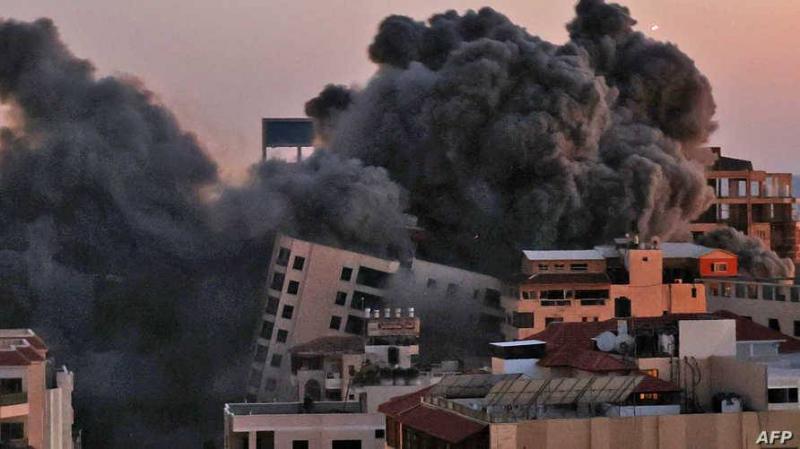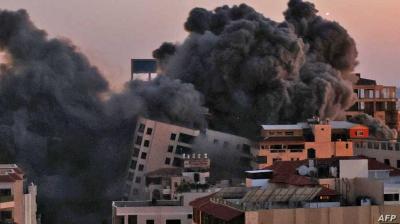Israel bombed the home of Yahya Sinwar, the leader of the Islamic Resistance Movement (Hamas) in the Gaza Strip, early on Sunday morning. Sirens for incoming rockets were activated in Israeli border towns after dawn, as the military operations entered their seventh day with no signs of waning. The Palestinian Health Ministry reported that at least 174 Palestinians have been killed in Gaza since Monday, including 47 children. Israel announced ten deaths, including two children.
The United Nations Security Council is set to convene on Sunday to discuss the worst outbreak of violence between Israel and the Palestinians in years. UN spokesman Stéphane Dujarric stated on Saturday that UN Secretary-General Antonio Guterres reminded "all parties that any indiscriminate targeting of civilian and media buildings violates international law and must be avoided at all costs." Both Israel and Hamas insisted on continuing cross-border bombardments after Israel destroyed a 12-story building in Gaza that housed the offices of the Associated Press and Qatar's Al Jazeera.
The Israeli military stated that the al-Jalaa tower was a legitimate military target because it contained military offices for Hamas and that warnings were issued to civilians to evacuate the building before the attack. The Associated Press condemned the attack and requested evidence from the Israelis. The agency stated, "The Associated Press office has been in this building for 15 years. We have no indication that Hamas was in the building or active in it."
In what it described as a response to Israel's destruction of the al-Jalaa building, Hamas launched 120 rockets overnight, and the Israeli army reported that a significant number were intercepted, with about ten falling back into Gaza. Israelis rushed to shelters as sirens sounded for rockets aimed at Tel Aviv and the southern city of Be'er Sheva. Medics reported that around ten people were injured while rushing for shelter.
In a series of airstrikes early Sunday morning, the Israeli army said it targeted the home of Yahya Sinwar in Khan Younis in southern Gaza. Sinwar, who was released by Israel from prison in 2011, heads the political and military wings of the movement in Gaza. Another airstrike reportedly killed a neurologist in Gaza and injured his wife and daughter, according to Palestinian medics and relatives.
The Israeli security cabinet is scheduled to meet on Sunday morning to discuss further operations. Israeli Prime Minister Benjamin Netanyahu stated late Saturday, "We are still in the midst of this operation, and it is not over yet. This operation will continue as long as necessary."
Hamas initiated the rocket attack on Monday after weeks of rising tensions due to a court case to evict several Palestinian families in East Jerusalem and in response to clashes between Israeli police and Palestinians near the Al-Aqsa Mosque during Ramadan. Ismail Haniyeh, Hamas's leader, speaking before crowds of protesters in the Qatari capital Doha on Saturday, said the fighting is fundamentally about Jerusalem. He added that "the Zionists" believe they can demolish the Al-Aqsa Mosque and displace Palestinians in Sheikh Jarrah. He addressed Netanyahu, saying, "Do not play with fire." Haniyeh declared that Jerusalem is at the center of the current battle.
Israel considers all of Jerusalem its capital, a claim that lacks international recognition. The Israeli army stated on Saturday that Hamas and Islamic Jihad groups have launched over 2,000 rockets from Gaza since Monday. Israel has conducted over a thousand airstrikes and artillery attacks on the densely populated region, claiming they are directed at Hamas and other armed factions.
War Crimes
Last week, the prosecutor of the International Criminal Court, Fatou Bensouda, told Reuters that the court is "closely monitoring" the latest escalation in fighting amid an ongoing investigation into allegations of war crimes from previous rounds of conflict. Netanyahu accused Hamas of "committing a double war crime" by targeting civilians and using Palestinian civilians as "human shields."
The United States has made a series of diplomatic efforts in recent days to halt the violence. Hady Amr, Deputy Assistant Secretary of State for Israel and the Palestinians, and President Joe Biden's envoy, arrived in Israel on Friday for talks. The White House reported that Biden spoke with both Netanyahu and Palestinian President Mahmoud Abbas late Saturday and updated them on American diplomatic efforts.
Complicating diplomatic efforts is the lack of communication between the U.S. and most Western powers with Hamas, which they consider a terrorist organization. Moreover, Abbas, whose power base is in the occupied West Bank, wields no influence over Hamas in Gaza.
In Israel, the conflict has coincided with violence in communities that include a mix of Jews and Arabs. Jewish synagogues have been attacked, and shops owned by Arabs have been looted. Violent clashes have also escalated in the occupied West Bank. Israeli forces have killed at least 12 Palestinians in the occupied West Bank since Friday, most during clashes.




